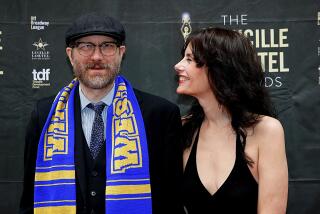Christine Jorgensen Is Fighting a New Battle
- Share via
In the 36 years since the operation that would change the way the world looked on transsexuals, Christine Jorgensen has evolved from being an object of ridicule to a respected advocate of sexual tolerance.
But in 1952, when a handsome ex-GI named George Jorgensen Jr. walked into a Danish operating room and came out a willowy blonde named Christine, the headlines and notoriety that followed were not always kind.
Now 62 and living in semiretirement in San Clemente, Jorgensen is doing battle again. But this time she faces an opponent far more formidable than prejudice: Christine Jorgensen is fighting cancer.
“I think I reacted very sane and sensibly to it,” Jorgensen said Friday, recalling the diagnosis of bladder and lung cancer that came in January, 1987. “I came home and went into the bathroom and looked in the mirror, and said I may as well as get rid of the ‘Why me?’ syndrome. So I looked in the mirror and said, ‘Why not me?’
“I said, ‘This is cancer.’ I wanted to be up front and not try to deny it.”
Within days of the diagnosis, Jorgensen had an operation in which two tumors were removed from her bladder. At the same time, doctors discovered the disease had spread to her lungs.
Jorgensen has been undergoing chemotherapy and cobalt treatment for the past year. She said Friday that the lung cancer has diminished significantly.
She has lost no weight--”I’m actually quite a bit overweight”--and is fortunate in that she has suffered none of the nausea often associated with chemotherapy.
“It’s like anything else,” she said. “I am firmly convinced that psychology, how you approach it mentally, affects your recovery. I still joke and carry on. I see some of the patients who just shuffle in and out, and you just know that they aren’t going to make it.”
Family History of Cancer
Jorgensen is convinced that the cause of the cancer is genetic, noting that her mother, uncle and grandmother all died of the disease. Although she has been taking hormones regularly for years, she remains convinced that the cancer is not a result of the sex-change operation or decades of hormonal treatment.
“I’m also a heavy smoker,” said Jorgensen, who has smoked up to two packs daily since she was in her teens. “The doctor wants me to quit, but that’s kind of like locking the gate after the cow is already out, isn’t it?”
It is her role in the sexual revolution, serving to change many people’s attitudes toward transsexuals and homosexuals, that means the most to Jorgensen.
“I am very proud now, looking back, that I was on that street corner 36 years ago when a movement started,” she said. “It was the sexual revolution that was going to start with or without me. We may not have started it, but we gave it a good swift kick in the pants.”
Of her operation that became a scandal when it hit the U.S. press in 1952, she said, “It wouldn’t get on the 95th page of the newspaper if it happened today. It’s not news anymore.
“What people still don’t understand is that the important thing is identity. You don’t do it primarily for sexual reasons, you do it because of who you are. Most people can’t accept that no animal is 100% male or 100% female. We are dealing with a series of degrees.”
Although the sex-change operation in Denmark was supposed to remain a secret--it was a family friend who leaked it to the press--Jorgensen learned to live with the notoriety and eventually profited from it.
Her 1967 autobiography was made into a movie; for years she has been a favorite on the talk-show and lecture circuit, and for many years she enjoyed a moderately successful career in a nightclub act.
“Looking back, all of these wonderful things would not have happened to me if it had been kept a secret,” she said.
Jorgensen is working on yet another book--”this one is going to tell all “--and would like to find a U.S. distributor for a Dutch-made documentary film on transsexuals, lesbians and female impersonators.
“It was produced in Denmark, and they flew me over to Denmark for a segment in it. I have the American rights for it. It’s a documentary called ‘Paradise Not for Sale,’ and it’s about different life styles. It is done so beautifully, talking about the ambiguity between the male and the female.”
Papers Given to Library
Only recently, Jorgensen said, she donated all her documents and personal papers to the Royal Library in Copenhagen, which put the works on exhibit.
“There are still so many things I’d like to do. I’d love to do ‘Murder, She Wrote.’ I could be the murderess or the corpse!”
But the ongoing therapy to halt the spread of the disease must come first.
“The roughest thing about cancer is that you have to devote so much time and thought to it,” Jorgensen said. “You go from day to day and all of a sudden you are not planning for five years from now. I was going to buy another house, but now I think, why?
“You just can’t make the plans that you used to.”
More to Read
Sign up for Essential California
The most important California stories and recommendations in your inbox every morning.
You may occasionally receive promotional content from the Los Angeles Times.










